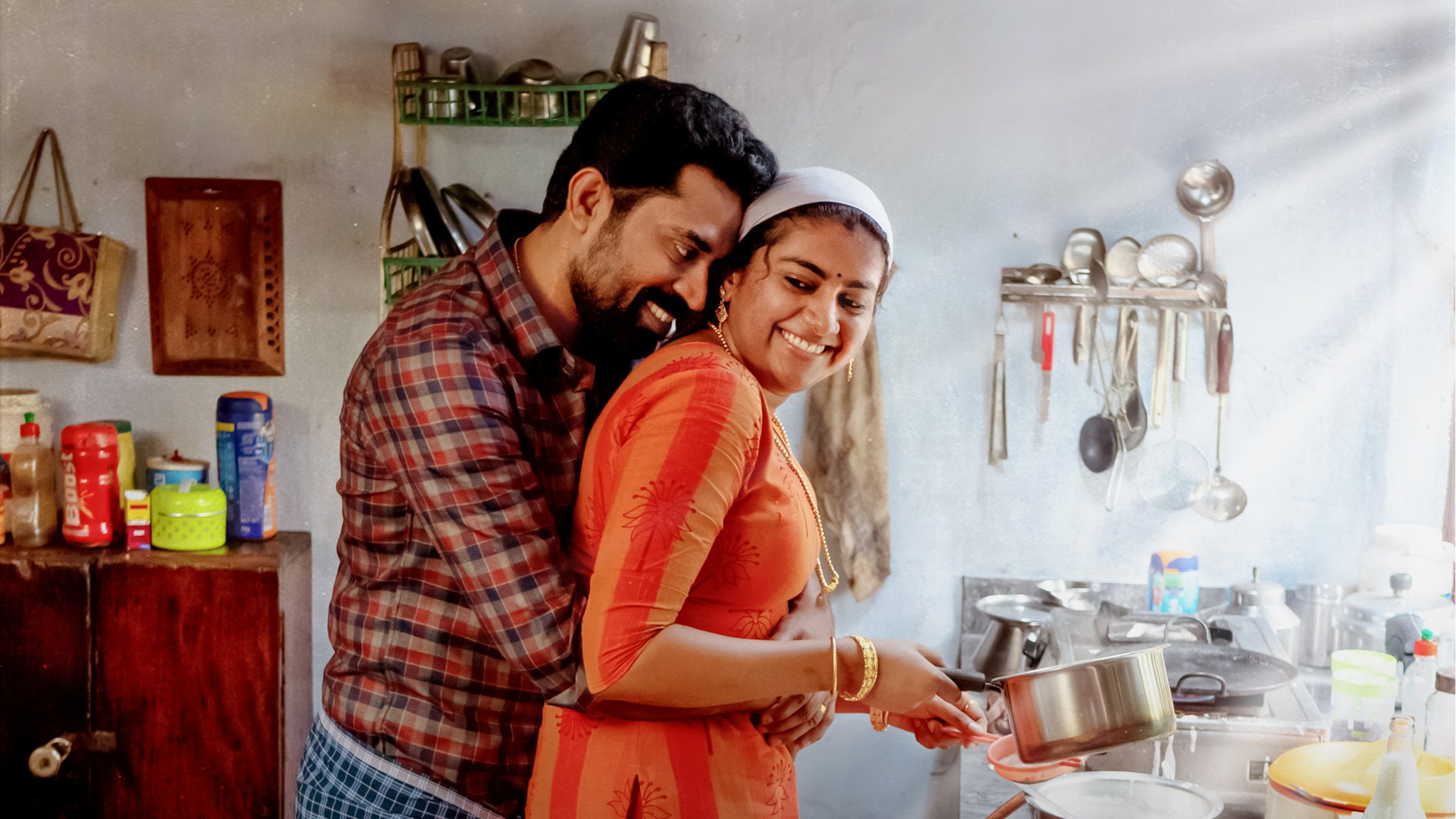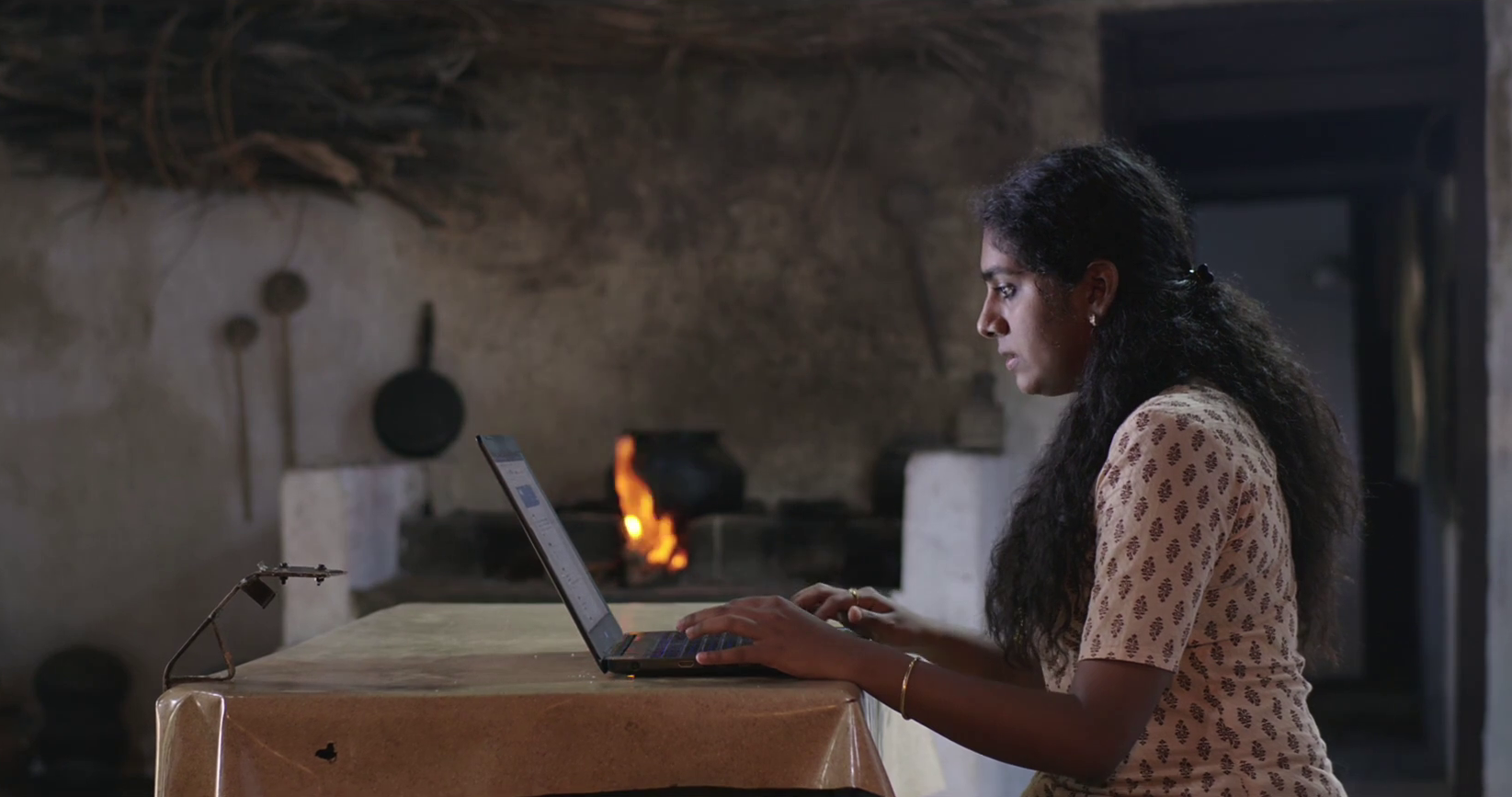
w”The quickest way to a man’s heart is through his stomach” – Here’s a famous saying that we have been conditioned to believe. Men are supposed to savor all the delicacies in the world. Women are supposed to serve them with love. As compensation, she will make her way to his heart. Romantic much?
Jeo Baby’s film is called The Great Indian Kitchen (TGIK). The focus is Kerala, a small state in the southern tip of India, and the way they treat women in a well-to-do family and organized society. To make a confession, I always wore a badge of false pride for having been brought up in the state that bears the highest literacy rate in India. My own ability to read and understand various languages, society’s inclination to science, and overall industriousness made me feel superior at some point or the other. However, The Great Indian Kitchen reminded me of the demarcation that the state’s society has set by default. The kitchen is a woman’s ‘department’ (I am using words that commonly float around). If there is something to fix at home or if you go to travel to places, the man is in charge. Teenaged boys are often encouraged to do grocery shopping while their female counterparts – however bright they are – take their baby steps to learn household chores and cooking. “Naale vere oru veetil kayari chellendatha” (tomorrow she’s meant to be a part of another family) is a common remark. Being financially literate, Malayali families also plan fixed deposits in their daughters’ names which shall be withdrawn around their marriages – mostly to spend on chunks of gold jewellery that they would wear at their weddings. This is aside from their mother’s heirloom jewels if any. A daughter’s birth, in an unsaid manner, becomes a liability. The high point is the additional satisfaction that Malayali families derive from conducting these weddings with great pomp and show. For a state that observed a matrilineal family system in some parts even years after India’s independence, the aforementioned practice (which commoditizes women besides stripping individuality off their personality) is a shocker.
The female protagonist (essayed by Nimisha Sajayan) in Jeo Baby’s film has modest ambitions. The young woman is qualified to be a teacher – which is, by and large, a 10 to 5 job. If she were to be ‘permitted’ by her intimidating husband and authoritarian father-in-law, she would still have taken a plunge into having a career. But no, as the father-in-law assertively states, slogging in the kitchen is a designated career to the family’s women. Now, even at the cost of straying away from being a little considerate, her teacher husband’s (Suraj Venjaramoodu) work does not take him to a faraway place or make him slog extra hours in a tough environment. If he practices Yoga every morning to keep himself fit, the physical activity she has is running around the house to fulfill domestic duties besides, of course, the passionless sex she is regularly subject to in bed. TGIK also chronicles how normal bodily function (periods) affects the way a woman moves around in a household.
Then again, at one point, we understand how the mistake is never singularly the man’s or the woman’s in TGIK. It is about a society that is stuck in a state of denial. They wouldn’t swap roles or empathize with each other’s miseries. Not to forget, we live in a world that is more comfortable riding with a male driver as opposed to a female one. ‘Maa ke haath ka khana’ always scores above a five-star chef’s seven-course spread – at least prototypically. A female nurse is believed to be more tender whereas a male doctor’s decisiveness finds more acceptance.

Although it is not a cinematic faux pas in any way, the woman in The Great Indian Kitchen never strikes a head-on conversation with her husband. This instinctive distance and submissiveness are deep-rooted. The man is elder than her by age, he is dominant in bed, he runs the family’s finances, and he has grown up in the house that she feels threatened to take a deep breath in. In order to rebel, she barely had a support system or a backup plan. All she had was a flicker of hope that things would improve. Instead, her anger erupts at a space that is familiar – her own family home, which again is a breeding ground of similar, unequal practices.
TGIK is decidedly structured in a way that you become a part of the woman’s journey from a new bride to a full-fledged homemaker. For instance, the framing makes way from being swift to lethargic. If cooking appears to be a scrumptious process in the earlier reels, we get a real picture behind the process in the latter half. Also to allow the story to hit the pinnacle of oppression, the filmmakers throw in a Sabarimala angle. It exposes the ways women respond to the controversial scenario. If there is a ‘feminichi’ (offensive Malayalam slang for a feminist) whose house is being attacked by religious fundamentalists, there’s also a group of women protesting against the Supreme Court’s verdict to allow women of all ages to the temple. Beyond both, there’s the protagonist whose passive support of the former stirs a fire in the family.
As The Great Indian Kitchen gets over, one (especially men) would wonder if all of it happens in every Kerala (or Indian) household. For a fact, the film presents a slightly exaggerated picture which might not be the case in all modern families today, but each of her dilemmas has appeared in fragments to women residing across the subcontinent. The climax, with a brave religious twist, gives us a major high with the woman taking a step by herself. But, hey, did the film’s men or the world around them change by her actions? Not one bit. This gut-wrenching portrayal of a grim reality is what makes Jeo Baby’s film revolutionary in every sense of the word. If this hugely discussed film wouldn’t kick start a renaissance of sorts in the way women are projected on the screen, nothing else would.
The Great Indian Kitchen gives us a woman who makes a choice.
Here’s a choice that is straightforward but difficult.
Her actions bear zero impact on others – be it men, women, and society.
Because the story is hers. Solely hers.

